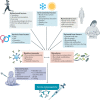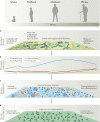Modulation of immune responses to vaccination by the microbiota: implications and potential mechanisms
- PMID: 34002068
- PMCID: PMC8127454
- DOI: 10.1038/s41577-021-00554-7
Modulation of immune responses to vaccination by the microbiota: implications and potential mechanisms
Abstract
The need for highly effective vaccines that induce robust and long-lasting immunity has never been more apparent. However, for reasons that are still poorly understood, immune responses to vaccination are highly variable between different individuals and different populations. Furthermore, vaccine immunogenicity is frequently suboptimal in the very populations who are at most risk from infectious disease, including infants, the elderly, and those living in low-income and middle-income countries. Although many factors have the potential to influence vaccine immunogenicity and therefore vaccine effectiveness, increasing evidence from clinical studies and animal models now suggests that the composition and function of the gut microbiota are crucial factors modulating immune responses to vaccination. In this Review, we synthesize this evidence, discuss the immunological mechanisms that potentially mediate these effects and consider the potential of microbiota-targeted interventions to optimize vaccine effectiveness.
© 2021. Springer Nature Limited.
Conflict of interest statement
D.J.L. receives funding from GlaxoSmithKline as part of a collaborative research agreement in this area. B.P. serves on the External Immunology Network of GlaxoSmithKline and is on the scientific advisory board of Medicago. S.C.B. and M.A.L. declare no competing interests.
Figures




Comment in
-
B and T cell responses to the BNT162b2 COVID-19 mRNA vaccine are not impaired in germ-free or antibiotic-treated mice.Gut. 2024 Jun 6;73(7):1222-1224. doi: 10.1136/gutjnl-2023-329810. Gut. 2024. PMID: 37500502 Free PMC article. No abstract available.
References
-
- Siegrist, C. A. Vaccine immunology. in Vaccines (eds Plotkin, S. A., Orenstein, W. A. & Offit, P. A.) 17–36 (Elsevier Inc, 2008).
Publication types
MeSH terms
Substances
Grants and funding
LinkOut - more resources
Full Text Sources
Other Literature Sources
Medical

